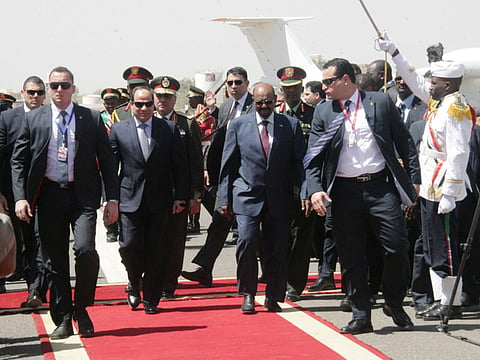Egypt, Ethiopia sign pact on controversial dam
Parties seeking to achieve a concept of joint benefit

Cairo: Leaders of Egypt, Ethiopia and Sudan on Monday signed a preliminary agreement on a controversial Ethiopian dam being built on the Nile, in a move to defuse a dispute that has soured ties between Cairo and Addis Ababa.
In a ceremony held in the Sudanese capital Khartoum and broadcast live on Egyptian television, President Abdul Fattah Al Sissi of Egypt, his Sudanese counterpart Hassan Al Bashir and Ethiopian Prime Minister Hailemariam Desalegn signed the pact, officially called the Declaration of Principles on the Renaissance Dam.
Al Sissi, who has been keen to defuse the row since he took office last June, told the ceremony that Ethiopia’s hydroelectric dam was a source of worry for Egyptians.
“The real value of our agreement is to reach a complete understanding so that technical studies [related to the dam] will be finalised,” Al Sissi said. “We are seeking to achieve a concept of joint benefit and to avoid harm”.
The Ethiopian prime minister told the ceremony that the $4.7 billion (Dh17.2 billion) facility will not harm Egypt and Sudan — two Nile countries.
The three leaders in their speeches pledged economic cooperation and joint development efforts.
The pact provides a mechanism for operating the dam and its storage levels, Egyptian Irrigation Minister Hussam Moghazi told semi-official newspaper Al Ahram without elaborating.
He added that the accord will be binding after the three countries choose a foreign consultancy firm to conduct technical studies on the dam. This should be in a matter of months.
Al Sissi is due to begin an official visit on Tuesday to Ethiopia, signalling warmer relations between the two African countries.
Cairo-Addis Ababa ties deteriorated in 2013 when Egypt’s then president Mohammad Mursi and other politicians threatened in a meeting, broadcast live on air, to bomb Ethiopia over its building of the dam.
In July 2013, the army led at the time by Al Sissi, deposed Mursi following enormous street protests against his one-year rule.
The Ethiopian dam has triggered wide fears in Egypt, which relies heavily on the Nile to cover the water needs of its population of 90 million people.
Egypt’s annual quota of the Nile waters is estimated at 55.5 billion cubic metres. Water sharing among the ten Nile Basin countries is regulated under a colonial-era treaty. Some Nile Basin countries have said the treaty is unfair.
Ethiopia has been urging the riparian countries to ratify a comprehensive framework agreement to replace the 1959 treaty that gives Egypt and Sudan the lion’s share of the Nile waters. Six countries have already signed the 2010 pact amid Egyptian protests.
Sign up for the Daily Briefing
Get the latest news and updates straight to your inbox



